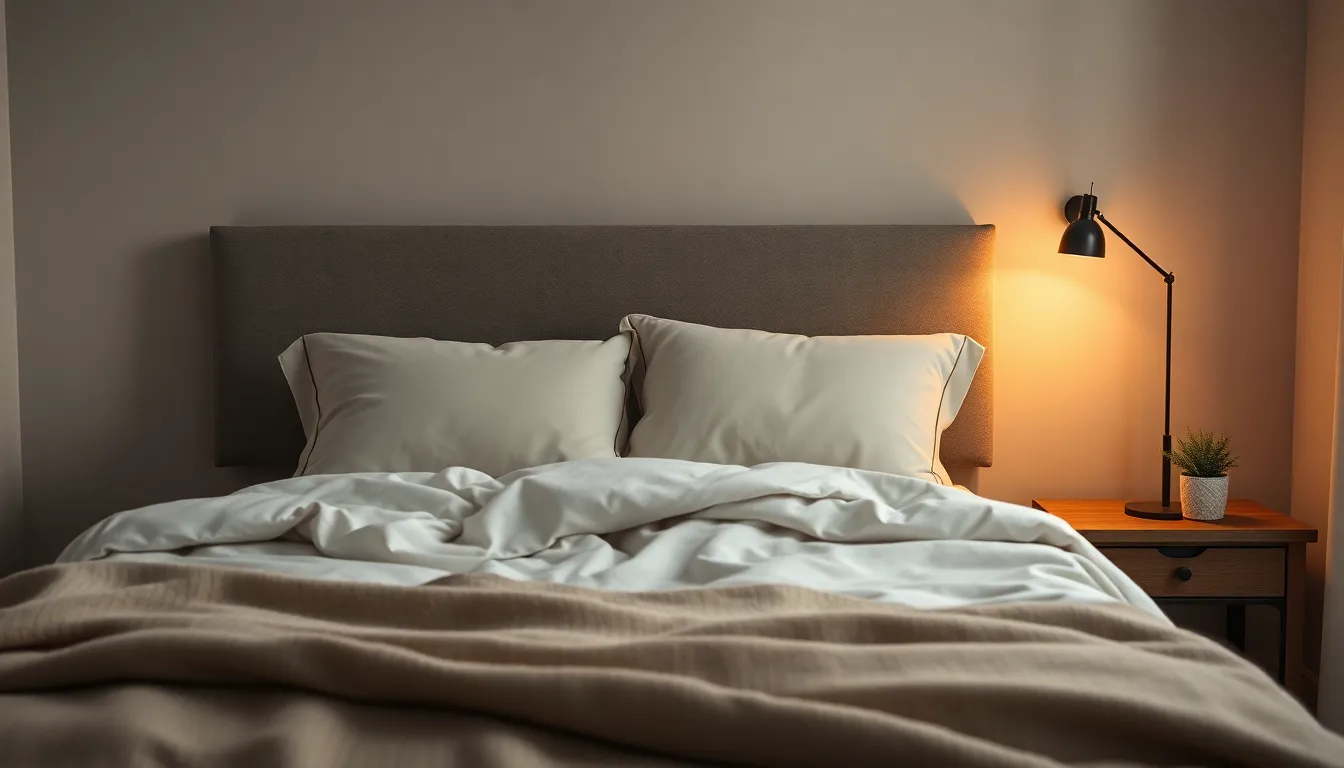In today’s fast-paced world, establishing a sleep routine is more crucial than ever. With the constant demands of work, social life, and technology, many struggle to prioritize quality sleep. Yet, a consistent sleep schedule can significantly enhance overall well-being, boosting mood, productivity, and health.
Creating a personalized sleep routine doesn’t have to be complicated. By incorporating simple habits and practices, anyone can improve their sleep quality and enjoy the benefits that come with it. Whether it’s winding down before bed or setting a regular sleep schedule, small changes can lead to big results. Understanding the importance of sleep and how to achieve it can transform lives for the better.
Table of Contents
ToggleUnderstanding Sleep Routine
Establishing a consistent sleep routine plays a crucial role in enhancing overall well-being. Quality sleep significantly influences mood, productivity, and health.
Importance of Sleep
Sleep serves essential functions for both physical and mental health. It supports cognitive performance, emotional regulation, and bodily repair. Adults typically require 7-9 hours of sleep per night to function optimally. Research indicates that consistent sleep patterns lead to better memory retention and improved focus. Furthermore, adequate sleep strengthens the immune system, reducing the risk of chronic conditions like heart disease and diabetes.
Effects of Irregular Sleep Patterns
Irregular sleep patterns can disrupt biological rhythms, leading to negative health outcomes. Individuals with inconsistent sleep schedules often experience fatigue and impaired cognitive performance. Chronic irregularity can also heighten stress levels, anxiety, and irritability. Studies show that those with irregular sleep patterns have an increased likelihood of developing sleep disorders and other health issues. Establishing a regular sleep routine fosters a stable circadian rhythm, promoting better quality sleep and overall health.
Components of a Healthy Sleep Routine

Establishing effective components in a sleep routine enhances sleep quality and overall health. Key elements include consistency in sleep schedules and a relaxing bedtime environment.
Consistency in Sleep Schedule
Maintaining a regular sleep schedule entrenches the body’s circadian rhythm. Going to bed and waking up at the same time daily encourages predictable sleep patterns. Adults benefit most from 7-9 hours of sleep; therefore, setting consistent sleep times supports this requirement. Sticking to this schedule, even on weekends, helps prevent disruptions that affect mood and cognitive performance. Avoiding excessive naps, particularly in the afternoon, ensures nighttime sleep isn’t compromised.
Creating a Relaxing Bedtime Environment
A calming bedtime environment directly influences sleep quality. Dimming lights and reducing noise levels create a serene atmosphere conducive to relaxation. Temperature plays a crucial role; a cooler room, ideally between 60-67°F (15-19°C), aids in promoting deeper sleep. Incorporating comfortable bedding and pillows enhances physical comfort as well. Additionally, minimizing screen time from devices like phones and televisions before bed reduces blue light exposure, which can interfere with melatonin production, thereby improving sleep onset. Engaging in relaxing activities such as reading, gentle stretching, or meditation can further prepare the mind and body for restful sleep.
Tips for Establishing a Sleep Routine
Creating a sleep routine involves intentional strategies to improve sleep quality and overall well-being. Implementing practical tips can lead to more restful nights and energized days.
Limiting Screen Time Before Bed
Limiting screen time before bed significantly enhances sleep quality. Research shows that blue light emitted by devices can interfere with melatonin production, making it harder to fall asleep. He or she should aim to unplug from electronic devices at least 30-60 minutes before bedtime. Instead of scrolling through social media or watching television, engaging in non-screen activities can promote relaxation and signal the brain to wind down. Consider reading a physical book, listening to calming music, or practicing mindfulness during this time.
Incorporating Relaxation Techniques
Incorporating relaxation techniques into a bedtime routine promotes a peaceful transition to sleep. Techniques such as deep breathing, progressive muscle relaxation, or gentle yoga can reduce stress and calm the mind and body. Individuals should dedicate 10-15 minutes each night to these practices, creating a soothing ritual that prepares them for sleep. Establishing this consistent ritual reinforces cues for the body, making it easier to associate certain activities with bedtime and enhancing overall sleep quality.
Common Sleep Disorders and Their Impact on Routine
Sleep disorders can significantly disrupt sleep routines, leading to numerous negative health effects. Understanding these disorders aids in managing their impact on daily life.
Insomnia
Insomnia occurs when an individual has difficulty falling asleep, staying asleep, or waking up too early. This condition affects approximately 30% of adults, with chronic insomnia impacting about 10%. Insomnia decreases overall sleep quality, leading to fatigue, irritability, and difficulties concentrating during the day. It disrupts the body’s natural circadian rhythm, exacerbating stress and anxiety levels. Effective management strategies include cognitive behavioral therapy for insomnia (CBT-I), sleep hygiene practices, and, in some cases, medication. Addressing insomnia promptly can restore a more stable and consistent sleep routine.
Sleep Apnea
Sleep apnea is a serious condition characterized by repeated interruptions in breathing during sleep. Affecting an estimated 22 million Americans, it can lead to fragmented sleep and excessive daytime sleepiness. Obstructive sleep apnea, the most common type, results from throat muscles relaxing excessively during sleep. This disorder increases the risk of hypertension, heart disease, and metabolic disorders, severely impacting overall health and daily productivity. Treatment options include lifestyle changes, continuous positive airway pressure (CPAP) therapy, and surgical interventions. Timely intervention for sleep apnea can significantly enhance sleep quality and restore a consistent sleep routine.
Establishing a consistent sleep routine is vital for enhancing overall health and well-being. By prioritizing quality sleep and adopting simple habits, individuals can experience significant improvements in mood and productivity. A stable sleep schedule not only supports cognitive function but also fortifies the immune system.
Creating a calming bedtime environment and minimizing screen time helps reinforce healthy sleep patterns. Engaging in relaxing activities before bed can make a remarkable difference in sleep quality. For those facing sleep disorders, seeking appropriate management strategies is crucial for restoring a consistent sleep routine.
Ultimately, committing to a personalized sleep routine can transform one’s life, leading to better health and improved daily functioning. Embracing these practices paves the way for a more restful night and a brighter day ahead.



